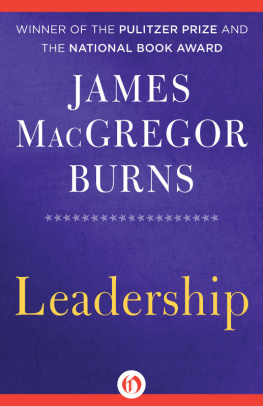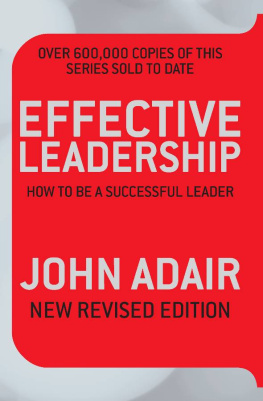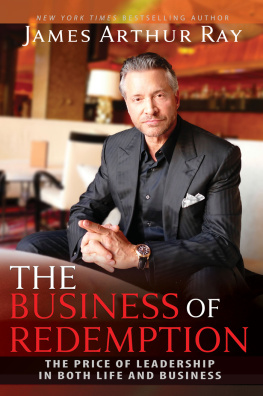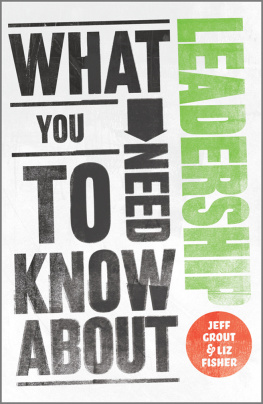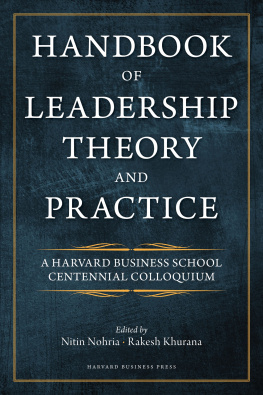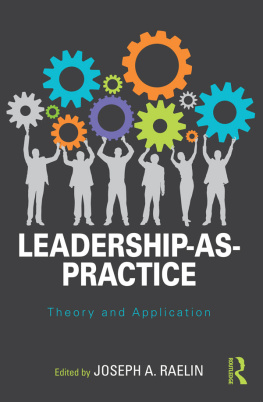
Leadership
James MacGregor Burns

For Joan
a meadow with nesting life spared by a mowers blade set high the flowering weeds and grasses strewn over the field to be raked and dried by rays from a fire set high in the heaven.
High Mowing
A prince will never lack for legitimate excuses to explain away his breaches of faith. Modern history will furnish innumerable examples of this behavior, showing how the man succeeded best who knew best how to play the fox. But it is a necessary part of this nature that you must conceal it carefully; you must be a great liar and hypocrite. Men are so simple of mind, and so much dominated by their immediate needs, that a deceitful man will always find plenty who are ready to be deceived.
Machiavelli
The Presidency is preeminently a place of moral leadership. All our great Presidents were leaders of thought at times when certain historic ideas in the life of the nation had to be clarified. That is what the office isa superb opportunity for reapplying, applying in new conditions, the simple rules of human conduct to which we always go back. Without leadership alert and sensitive to change, we are all bogged up or lose our way.
Franklin D. Roosevelt
To link oneself with the masses, one must act in accordance with the needs and wishes of the masses. There are two principles here: one is the actual needs of the masses rather than what we fancy they need, and the other is the wishes of the masses, who must make up their own minds instead of our making up their minds for them. We should pay close attention to the well-being of the masses, from the problems of land and labour to those of fuel, rice, cooking oil and salt. We should help them to proceed from these things to an understanding of the higher tasks which we have put forward. Such is the basic method of leadership.
Mao Tse-tung
PROLOGUE:
THE CRISIS OF LEADERSHIP
ONE OF THE MOST universal cravings of our time is a hunger for compelling and creative leadership. Many of us spent our early years in the eras of the titansFreud and Einstein, Shaw and Stravinsky, Mao and Gandhi, Churchill and Roosevelt, Stalin and Hitler and Mussolini. Most of these colossi died in the middle years of this century; some lingered on, while a few othersde Gaulle, Nehru, perhaps Kennedy and Kingjoined the pantheon of leadership. These giants strode across our cultural and intellectual and political horizons. Wefollowers everywhereloved or loathed them. We marched for them and fought against them. We died for them and we killed some of them. We could not ignore them.
In the final quarter of our century that life-and-death engagement with leadership has given way to the cult of personality, to a gee whiz approach to celebrities. We peer into the private lives of leaders, as though their sleeping habits, eating preferences, sexual practices, dogs, and hobbies carry messages of profound significance. Entire magazines are devoted to trivia about people and serious newspapers start off their news stories with a personality anecdote or slant before coming to the essence of the matter. Huge throngs parade in Red Square and in the Tien An Men Square with giant portraits of men who are not giants. The personality culta cult of devils as well as heroesthrives in both East and West.
The crisis of leadership today is the mediocrity or irresponsibility of so many of the men and women in power, but leadership rarely rises to the full need for it. The fundamental crisis underlying mediocrity is intellectual. If we know all too much about our leaders, we know far too little about leadership. We fail to grasp the essence of leadership that is relevant to the modern age and hence we cannot agree even on the standards by which to measure, recruit, and reject it. Is leadership simply innovationcultural or political? Is it essentially inspiration? Mobilization of followers? Goal setting? Goal fulfillment? Is a leader the definer of values? Satisfier of needs? If leaders require followers, who leads whom from where to where, and why? How do leaders lead followers without being wholly led by followers? Leadership is one of the most observed and least understood phenomena on earth.
It was not always so. For two millennia at least, leaders of thought did grapple with the vexing problems of the rulers vs. the ruled. Long before modern sociology Plato analyzed not only philosopher-kings but the influences on rulers of upbringing, social and economic institutions, and responses of followers. Long before todays calls for moral leadership and profiles in courage, Confucian thinkers were examining the concept of leadership in moral teaching and by example. Long before Gandhi, Christian thinkers were preaching nonviolence. Long before modern biography, Plutarch was writing brilliantly about the lives of a host of Roman and Greek rulers and orators, arguing that philosophers ought to converse especially with men in power, and examining questions such as whether an old man should engage in public affairs. From this biographer Shakespeare borrowed for his Antony and Cleopatra.
A rich literature on rulership flourished in the classical and middle ages. Laterfor reasons we must examinethe study of rulership and leadership ran into serious intellectual difficulties. Leadership as a concept has dissolved into small and discrete meanings. A recent study turned up 130 definitions of the word. A superabundance of facts about leaders far outruns theories of leadership. The world-famous New York Public Library has tens of thousands of biographies, monographs, and newspaper clippings on individual political leaders, but only one catalogue entry to political leadership (referring to an obscure politician of forty years ago).
There is, in short, no school of leadership, intellectual or practical. Does it matter that we lack standards for assessing past, present, and potential leaders? Without a powerful modern philosophical tradition, without theoretical and empirical cumulation, without guiding concepts, and without considered practical experiences, we lack the very foundations for knowledge of a phenomenonleadership in the arts, the academy, science, politics, the professions, warthat touches and shapes our lives. Without such standards and knowledge we cannot make vital distinctions between types of leaders; we cannot distinguish leaders from rulers, from power wielders, and from despots. Hitler called himselfand was calledthe Leader; his grotesque fhrerprinzip is solemnly examined as a doctrine of leadership. But Hitler, once he gained power and crushed all opposition, was no leaderhe was a tyrant. A leader and a tyrant are polar opposites.
Although we have no school of leadership, we do have in rich abundance and variety the makings of such a school. An immense reservoir of data and analysis and theories has been developed. No central concept of leadership has yet emerged, in part because scholars have worked in separate disciplines and subdisciplines in pursuit of different and often unrelated questions and problems. I believe, however, that the richness of the research and analysis and thoughtful experience, accumulated especially in the past decade or so, enables us now to achieve an intellectual breakthrough. Vitally important but largely unheralded work in humanistic psychology now makes it possible to generalize about the leadership process across cultures and across time. This is the central purpose of this book.
Next page
